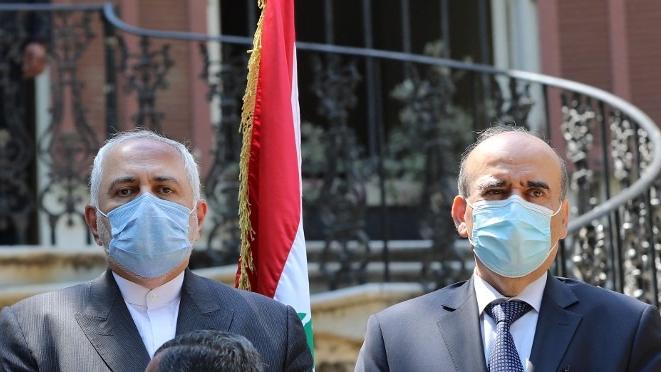 Lebanese Foreign Minister Charbel Wehbe (right) welcomes Iranian Foreign Minister Mohammad Javad Zarif (left), while mask-clad due to the COVID-19 coronavirus pandemic, at Lebanon's foreign ministry headquarters in the capital Beirut on Aug 14, 2020. (ANWAR AMRO / AFP)
Lebanese Foreign Minister Charbel Wehbe (right) welcomes Iranian Foreign Minister Mohammad Javad Zarif (left), while mask-clad due to the COVID-19 coronavirus pandemic, at Lebanon's foreign ministry headquarters in the capital Beirut on Aug 14, 2020. (ANWAR AMRO / AFP)
BEIRUT - Lebanon's president said on Tuesday the foreign minister's critical comments about Gulf states did not reflect official policy, seeking to avoid a further strain on ties with countries that have been Lebanon's allies and donors.
Mired in its worst economic crisis since a 1975-1990 civil war, Lebanon has lost the financial backing it once relied on from wealthy Sunni Muslim Gulf states that are increasingly frustrated at the rising influence of Hezbollah, a Lebanese group backed by their rival Shi'ite Iran.
Lebanese Foreign Minister Charbel Wehbe threatened to stoke new tensions in a television interview on Monday, when he appeared to blame the Gulf for the rise of Islamic State in Iraq and neighbouring Syria
Lebanese Foreign Minister Charbel Wehbe threatened to stoke new tensions in a television interview on Monday, when he appeared to blame the Gulf for the rise of Islamic State in Iraq and neighbouring Syria.
"Those countries of love, friendship and fraternity, they brought us Islamic State," he told Al Hurra without naming them. Wehbe said on Tuesday his comments were misrepresented and President Michel Aoun, a Maronite Christian like Wehbe and also an ally of Hezbollah, said the minister's comments were his "personal opinion" and praised "brotherly" ties with the Gulf.
READ MORE: From friend to foe: EU prepares sanctions on Lebanon
But others were swift to criticise Wehbe. Saad al-Hariri, the Sunni prime minister-designate now trying to form a cabinet and whose family's wealth was built up in Saudi Arabia, said Arab support was vital.
"As if the crises that the country is drowning in and the boycott it is suffering from are not enough," he said. Crushed by debt, Lebanon's economy has imploded, sending its currency into tailspin.
A massive blast at Beirut port in August added to its woes, prompting the last government to resign.
It is now acting in a caretaker role. Months later, politicians in the fractious, sectarian system are still squabbling over new appointments. Western donors, led by France, which also previously bailed out Lebanon, want a cabinet of technocrats before releasing aid.
ALSO READ: Turkish firm tells Lebanon to fix debts or face power cut
Mass protests in 2019 had also called for sweeping out the old elite, many of whom have held top posts for years.
Hariri, who like his assassinated father has led several cabinets, has yet to announce a new line up in a country where the prime minister should be a Sunni, the speaker of parliament a Shi'ite and president a Christian.
Saudi Arabia's foreign ministry summoned Lebanon's ambassador on Tuesday to hand over a memorandum protesting against what it described as "offenses" made by Wehbe.


